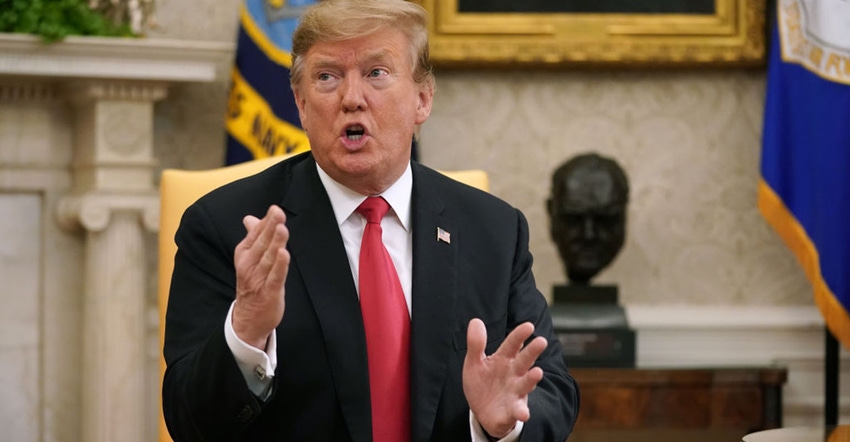
By Bryce Baschuk
The World Trade Organization’s top official received an unscheduled invitation Wednesday to meet with President Donald Trump.
With the U.S.-China trade fight and a renegotiated NAFTA in the rear-view mirror, Trump wanted to talk about WTO reform during his visit to Davos, Switzerland.
Afterwards, Trump summoned the media and brought WTO Director-General Roberto Azevedo to co-star in the press conference, where the president declared that they had discussed a “very dramatic” change for the WTO’s future.
“We’re talking about a whole new structure for the deal or we’ll have to do something,” Trump said.
A mystery then unfolded about what precisely will the WTO’s overhauled design will look like and what penalties await the WTO if its members did not agree.
Azevedo shrugged off the histrionics in a subsequent press conference.
“Reform is dramatic,” he told reporters. “Because reform by definition means you are changing things. And changes in the multilateral trading system don’t come easy.”
No joke. It’s been nearly two decades since nations initiated the failed Doha round effort to reshape the multilateral trading system for the 21st century.
The Trump administration’s approach has been to hogtie the WTO’s dispute settlement system by blocking all appointments to the appellate body — which is now unable to fully resolve global trade conflicts.
So what makes this decade’s push to change the WTO different? In a word — Trump.
He has called for WTO reform since the campaign trail in 2016 and has described the 25-year-old organization as the “worst trade deal ever.”
If the line sounds familiar it’s because that’s what Trump calls contracts he intends to renegotiate using a script that usually involves drama: threaten commercial Armageddon, force trading partners to the table, and call it the best deal ever regardless of whether it is or not.
That Trump is trying to lead the WTO’s much-needed reform effort is a welcome thing. But tactics matter more when fights aren’t one-on-one, and it’s important to consider the overhaul of the WTO with a dose of reality. The history of multilateral trade talks are fraught with false dawns, stalemates and breakdowns. Azevedo is a respected diplomat, but he’s no magician.
And the poison-pill changes that Trump is seeking to make to China and India’s status as developing nations will be difficult to obtain.
But it’s not impossible.
Azevedo acknowledged that a dose of theatrics might just be the antidote for curing what ails the WTO.
“If we are serious about changing and updating the WTO to make it more responsive to the changes of the 21st century, we need to be ready to be do things that are unusual, that are important, that are maybe even dramatic,” he said.
Charting the Trade War
Bloomberg Economics sees the danger that China will hit its $200 billion extra purchases commitment in its trade deal with the U.S. by shifting purchases from other countries. In 2017, the baseline year for the deal, the U.S. share of China’s imports in the target categories was 9% — adding the target commitments would take the share to 17%. Angola, the Republic of the Congo and Mongolia face the highest risk, with 57%, 49% and 47% of their total exports in 2017 coming from sales to China in categories covered by the deal, while focusing on major economies exporting agriculture and energy products — where substitution is easiest — Brazil, Saudi Arabia and Australia are most exposed.
Today’s Must Reads
A new world order | The global trading system isn’t on life support just yet, but experts say major economies need to redesign it before the seeds of protectionism take root.
Sinking shipments | Japanese exports dropped more than expected, a shipments slump that’s dragged on for a 13th month despite recent signs of a global manufacturing rebound.
Transatlantic tiff | The U.S. and Europe looked set for a renewed clash over everything from car tariffs to digital taxes as Trump turns his focus to new targets for trade deals.
Fuel frenzy | The world’s largest container shipping line is hiking a fuel surcharge after new environmental rules sent the industry’s biggest expense spiraling.
Stephanomics podcast | Bloomberg Senior Executive Editor Stephanie Flanders hosts a special episode from Davos, speaking with leaders on issues of economics, labor and climate change.
Economic Analysis
Dollar risk | The strong dollar crimps most of the potential positive impact of China’s commitment to ramp up U.S. purchases.
Say cheese | French luxury brands' exports to the U.S. hinge on progress made in digital tax talks.
Coming Up
Jan. 21-24: Business and government leaders meet at the World Economic Forum’s annual meeting. Stay on top of all of the action via Bloomberg’s Davos Diary newsletter. Click here to subscribe.
Jan. 24: Monthly release of the CPB World Trade Monitor
Jan. 28: Swiss exports
Jan. 29: U.S. advanced goods trade balance, Vietnam exports
Jan. 30: Hong Kong exports
--With assistance from Jenny Leonard.
To contact the author of this story:
Bryce Baschuk in Geneva at [email protected]
To contact the editor responsible for this story:
Brendan Murray at [email protected]
Zoe Schneeweiss
© 2020 Bloomberg L.P.
Read more about:
Donald TrumpAbout the Author(s)
You May Also Like




